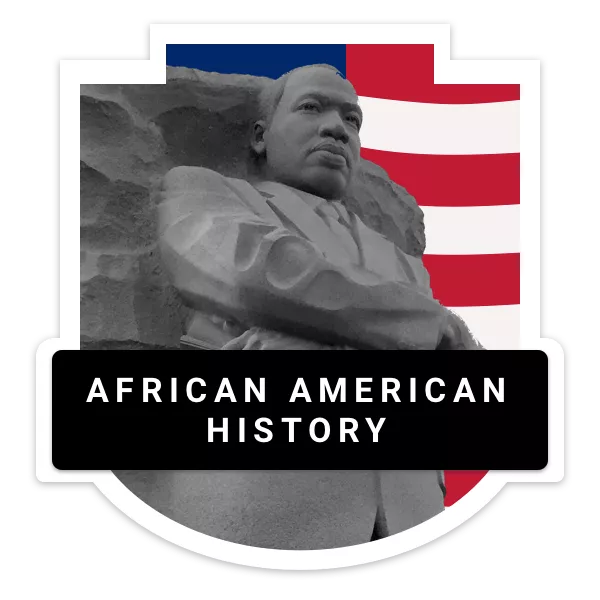African American History

African American History
African American history began with the arrival of Africans to North America. European colonization in the 1500's led to the transportation of enslaved Africans to the Americas. It was practiced in all of the Thirteen Colonies that would form the United States.
African Americans fought on both sides of the American Revolutionaty War. After the war, the Northern United States started to abolish slavery. This was not the case in the south where much of the economy relied upon slave labor to operate the plantations. For many years, the enslaved workers would try to escape to the north to find freedom using the Underground Railroad.
The controversy over ending slavery led to the American Civil War in the 1860's. During this time. President Abraham Lincoln issued the Thirteenth Amendment, abolishing slavery. The fight between the northern and southern states ended in 1865. With the defeat of the Confederate army, African Americans living in the south were granted equal rights.
The end of the Civil War did not end racial segregation. White opposition to the rights of African Americans led to the Jim Crow laws. These laws, eastablished in the Southern United States, mandated racial segregation in public places. Whites and Blacks would have seperate bathrooms, drinking fountains, schools, and other facilities.
In the 1950' and 1960's, the civil rights movement, led by activists such as Martin Luther King Jr. and Rosa Parks, began. Their non-voilent approach to ending racial segregation successfully persuaded the federal government to pass the Civil Rights Act of 1964.
Despite the progress made over the past 300 years, the struggle for equal rights continues today. The Black Lives Matter movement, started in 2013, highlights the need for more progress. It's important that we all learn from these events in history so we can inspire and build a better society for all future generations.
Sticker Collection
.webp)
16th Street Baptist Church
Alabama, USA
The First Colored Baptist Church of Birmingham was a rallying point for African Americans during the Civil Rights era.
Photo by Adam Jones

African Burial Ground National Monument
New York, USA
A historic monument to the over 400 Africans buried nearby in the 17th century.
Photo by NatalieMaynor

Alabama State Capitol
Alabama, USA
Martin Luther King Jr gave an impassioned speech here at the end of the Selma to Montgomery march in 1965.
Photo by Ron Cogswell

Booker T. Washington National Monument
Virginia, USA
Learn about the life of Booker T. Washington, an educator and presidential adviser born into slavery.
Photo by Todd Van Hoosear

Boston African American National Historic Site
Massachusetts, USA
A historic area dedicated to preserving the history and culture of the African American community.
Photo by Tony Fischer

Brown v Board of Education National Historic Site
Kansas, USA
A historic site commemorating the decision aimed at ending racial segregation in public schools.
Photo by Midwest National Parks

Charles Young Buffalo Soldiers National Monument
Ohio, USA
Learn about the life of an escaped slave who became the first African-American colonel in the US army.
Photo by Matthew Dillon

Fort Pillow State Historic Park
Tennessee, USA
The historic site of the Battle of Fort Pillow and massacre of surrendering African-American troops.
Photo by Guillaume Capron

Frederick Douglass National Historic Site
Washington, D.C., USA
The site preserves the home of prominent African-American leader Frederick Douglass.
Photo by David

Freemen’s Colony
North Carolina, USA
An island colony of African Americans living as freedmen and civilians after the Civil War.
Photo by Ken Lund

George Washington Carver National Monument
Missouri, USA
Visit the home of the most prominent African American scientist of the early 20th century.
Photo by Matthew Dillon

Harriet Tubman Underground Railroad National Historical Park
Maryland, USA
Learn about the life of “Moses” a former slave that helped others escape to freedom in the North.
Photo by F Delventhal

Nicodemus National Historic Site
Kansas, USA
Founded in 1877, the historic site preserves the once bustling African American town.
Photo by Chris

Tuskegee Airmen National Historic Site
Alabama, USA
Visit Moton Field where the Army Air Corps trained the first African American airmen to fly and maintain combat aircraft.
Photo by Ron Cogswell

Freedom Riders National Monument
On May 14, 1961, an angry mob attacked a group of white and black Freedom Riders who were demanding an end to racial segregation on interstate busing.
Photo by Lynda & Ron Albright

Martin Luther King Jr Memorial
Built from white granite, the memorial stands 30 feet tall.

Rosa Parks Bus
One of the most important artifacts from the civil rights movement.
Photo by Amaury Laporte
